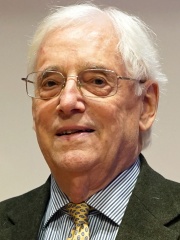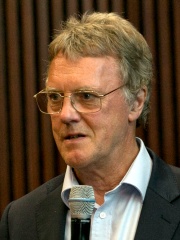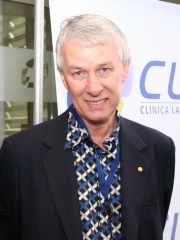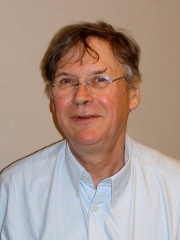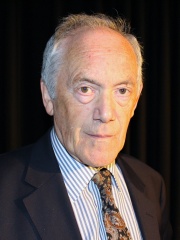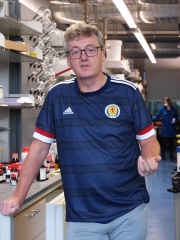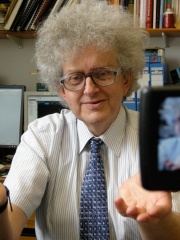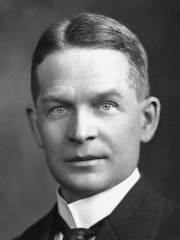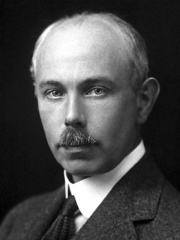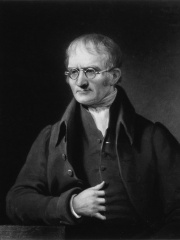
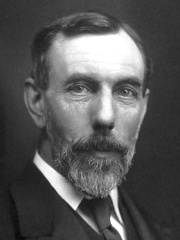

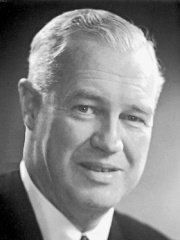

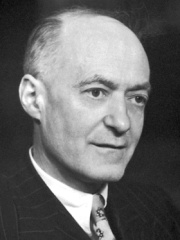
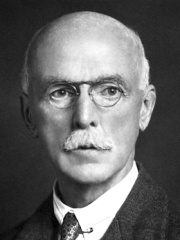
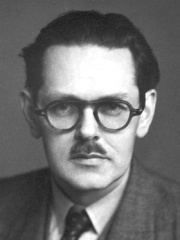
The Most Famous
CHEMISTS from United Kingdom
This page contains a list of the greatest British Chemists. The pantheon dataset contains 602 Chemists, 74 of which were born in United Kingdom. This makes United Kingdom the birth place of the 3rd most number of Chemists behind United States, and Germany.
Top 10
The following people are considered by Pantheon to be the top 10 most legendary British Chemists of all time. This list of famous British Chemists is sorted by HPI (Historical Popularity Index), a metric that aggregates information on a biography's online popularity. Visit the rankings page to view the entire list of British Chemists.

1. John Dalton (1766 - 1844)
With an HPI of 83.53, John Dalton is the most famous British Chemist. His biography has been translated into 103 different languages on wikipedia.
John Dalton (; 5 or 6 September 1766 – 27 July 1844) was an English chemist, physicist, and meteorologist whose work laid the foundations of modern atomic theory and stoichiometric chemistry. Building on earlier ideas about the indivisibility of matter and his own precise measurements of combining ratios, Dalton proposed that each chemical element consists of identical atoms of characteristic weight, and that compounds are formed when atoms of different elements combine in fixed whole-number proportions. His A New System of Chemical Philosophy (1808) presented a coherent atomic model, supplied relative atomic weights and symbolic notation, and established the quantitative framework that shaped nineteenth-century chemistry and remains the basis of modern chemical thought. Dalton was also a pioneering meteorologist and physicist, keeping daily weather observations for over fifty years, formulating the first empirical law of partial pressures (later known as Dalton’s Law), and studying the behavior of gases through his work on vapor pressure and gas solubility. His investigations into his own color blindness led to the first scientific description of the condition—still called Daltonism in several languages—and helped establish experimental methods for linking perception with physiology. Elected a Fellow of the Royal Society in 1822 and awarded its Royal Medal in 1826, Dalton became the first British scientist to develop a quantitative atomic theory and one of the key figures in the transition of chemistry from a qualitative to a mathematical science. In honour of Dalton's work, a unit of atomic mass, the dalton, symbol Da, is officially accepted for use with the SI.

2. William Ramsay (1852 - 1916)
With an HPI of 79.11, William Ramsay is the 2nd most famous British Chemist. His biography has been translated into 85 different languages.
Sir William Ramsay (; 2 October 1852 – 23 July 1916) was a Scottish chemist who discovered the noble gases and received the Nobel Prize in Chemistry in 1904 "in recognition of his services in the discovery of the inert gaseous elements in air" along with his collaborator, John William Strutt, 3rd Baron Rayleigh, who received the Nobel Prize in Physics that same year for their discovery of argon. After the two men identified argon, Ramsay investigated other atmospheric gases. His work in isolating argon, helium, neon, krypton, and xenon led to the development of a new section of the periodic table.

3. John Macleod (1876 - 1935)
With an HPI of 78.77, John Macleod is the 3rd most famous British Chemist. His biography has been translated into 62 different languages.
John James Rickard Macleod, (6 September 1876 – 16 March 1935), was a Scottish biochemist and physiologist. He devoted his career to diverse topics in physiology and biochemistry, but was chiefly interested in carbohydrate metabolism. He is noted for his role in the discovery and isolation of insulin during his tenure as a lecturer at the University of Toronto, for which he and Frederick Banting received the 1923 Nobel prize in Physiology or Medicine. Awarding the prize to Macleod was controversial at the time, because according to Banting's version of events, Macleod's role in the discovery was negligible. It was not until decades after the events that an independent review acknowledged a far greater role than was attributed to him at first.

4. Alexander R. Todd (1907 - 1997)
With an HPI of 78.07, Alexander R. Todd is the 4th most famous British Chemist. His biography has been translated into 59 different languages.
Alexander Robertus Todd, Baron Todd (2 October 1907 – 10 January 1997) was a British biochemist whose research on the structure and synthesis of nucleotides, nucleosides, and nucleotide coenzymes gained him the Nobel Prize for Chemistry in 1957.
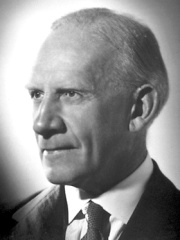
5. Robert Robinson (1886 - 1975)
With an HPI of 77.85, Robert Robinson is the 5th most famous British Chemist. His biography has been translated into 58 different languages.
Sir Robert Robinson (13 September 1886 – 8 February 1975) was a British organic chemist and Nobel laureate recognised in 1947 for his research on plant dyestuffs (anthocyanins) and alkaloids. In 1947, he also received the Medal of Freedom with Silver Palm.

6. Humphry Davy (1778 - 1829)
With an HPI of 76.94, Humphry Davy is the 6th most famous British Chemist. His biography has been translated into 84 different languages.
Sir Humphry Davy, 1st Baronet (17 December 1778 – 29 May 1829) was a British chemist and inventor who invented the Davy lamp and a very early form of arc lamp. He is also remembered for isolating, by using electricity, several elements for the first time: potassium and sodium in 1807 and calcium, strontium, barium, magnesium and boron the following year, as well as for discovering the elemental nature of chlorine and iodine. Davy also studied the forces involved in these separations, inventing the new field of electrochemistry. He is credited with discovering clathrate hydrates. In 1799, he experimented with nitrous oxide and was astonished at how it made him laugh. He nicknamed it "laughing gas" and wrote about its potential as an anaesthetic to relieve pain during surgery. Davy was a baronet, President of the Royal Society (PRS), Member of the Royal Irish Academy (MRIA), a founder member and Fellow of the Geological Society of London, and a member of the American Philosophical Society. Berzelius called Davy's 1806 Bakerian Lecture "On Some Chemical Agencies of Electricity" "one of the best memoirs which has ever enriched the theory of chemistry."

7. Cyril Norman Hinshelwood (1897 - 1967)
With an HPI of 76.52, Cyril Norman Hinshelwood is the 7th most famous British Chemist. His biography has been translated into 58 different languages.
Sir Cyril Norman Hinshelwood (19 June 1897 – 9 October 1967) was a British physical chemist and expert in chemical kinetics. His work in reaction mechanisms earned the 1956 Nobel Prize in chemistry.

8. Arthur Harden (1865 - 1940)
With an HPI of 76.39, Arthur Harden is the 8th most famous British Chemist. His biography has been translated into 63 different languages.
Sir Arthur Harden, FRS (12 October 1865 – 17 June 1940) was a British biochemist. He shared the Nobel Prize in Chemistry in 1929 with Hans Karl August Simon von Euler-Chelpin for their investigations into the fermentation of sugar and fermentative enzymes. He was a founding member of the Biochemical Society and editor of the Biochemical Journal for 25 years.

9. Archer Martin (1910 - 2002)
With an HPI of 76.38, Archer Martin is the 9th most famous British Chemist. His biography has been translated into 55 different languages.
Archer John Porter Martin (1 March 1910 – 28 July 2002) was a British chemist who shared the 1952 Nobel Prize in Chemistry for the invention of partition chromatography with Richard Synge.
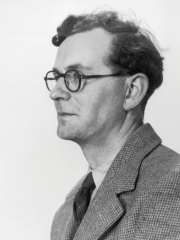
10. Rodney Robert Porter (1917 - 1985)
With an HPI of 75.95, Rodney Robert Porter is the 10th most famous British Chemist. His biography has been translated into 51 different languages.
Rodney Robert Porter (8 October 1917 – 6 September 1985) was a British biochemist and Nobel laureate.
People
Pantheon has 74 people classified as British chemists born between 1640 and 1968. Of these 74, 9 (12.16%) of them are still alive today. The most famous living British chemists include M. Stanley Whittingham, John E. Walker, and Peter J. Ratcliffe. The most famous deceased British chemists include John Dalton, William Ramsay, and John Macleod.
Living British Chemists
Go to all RankingsM. Stanley Whittingham
1941 - Present
HPI: 73.91
John E. Walker
1941 - Present
HPI: 71.02
Peter J. Ratcliffe
1954 - Present
HPI: 70.64
Richard J. Roberts
1943 - Present
HPI: 66.22
Tim Hunt
1943 - Present
HPI: 64.14
Peter Atkins
1940 - Present
HPI: 58.71
David MacMillan
1968 - Present
HPI: 55.69
Carol V. Robinson
1956 - Present
HPI: 52.38
Martyn Poliakoff
1947 - Present
HPI: 51.23
Deceased British Chemists
Go to all RankingsJohn Dalton
1766 - 1844
HPI: 83.53
William Ramsay
1852 - 1916
HPI: 79.11
John Macleod
1876 - 1935
HPI: 78.77
Alexander R. Todd
1907 - 1997
HPI: 78.07
Robert Robinson
1886 - 1975
HPI: 77.85
Humphry Davy
1778 - 1829
HPI: 76.94
Cyril Norman Hinshelwood
1897 - 1967
HPI: 76.52
Arthur Harden
1865 - 1940
HPI: 76.39
Archer Martin
1910 - 2002
HPI: 76.38
Rodney Robert Porter
1917 - 1985
HPI: 75.95
Frederick Soddy
1877 - 1956
HPI: 75.84
Francis William Aston
1877 - 1945
HPI: 75.65
Overlapping Lives
Which Chemists were alive at the same time? This visualization shows the lifespans of the 25 most globally memorable Chemists since 1700.


